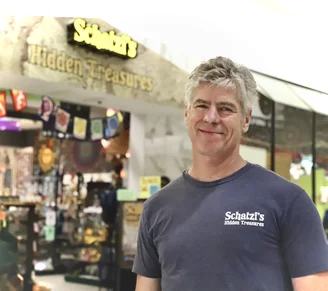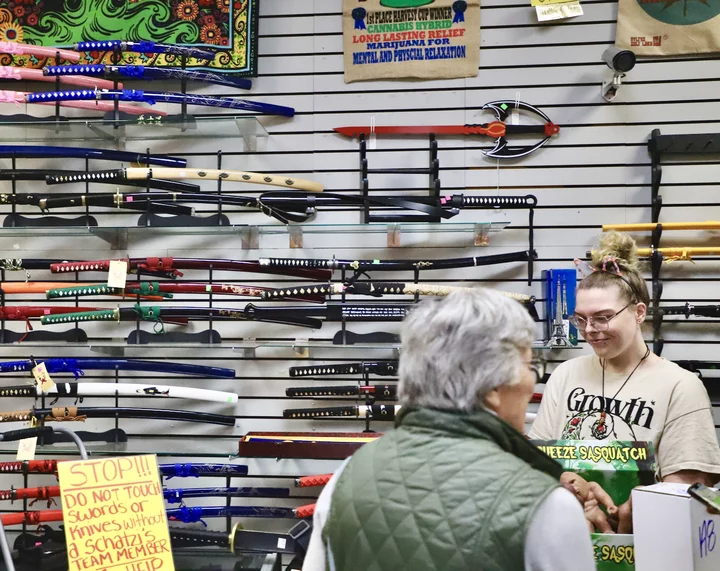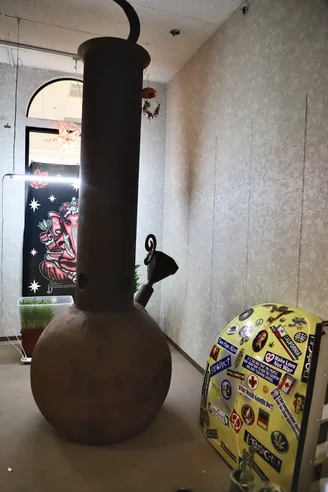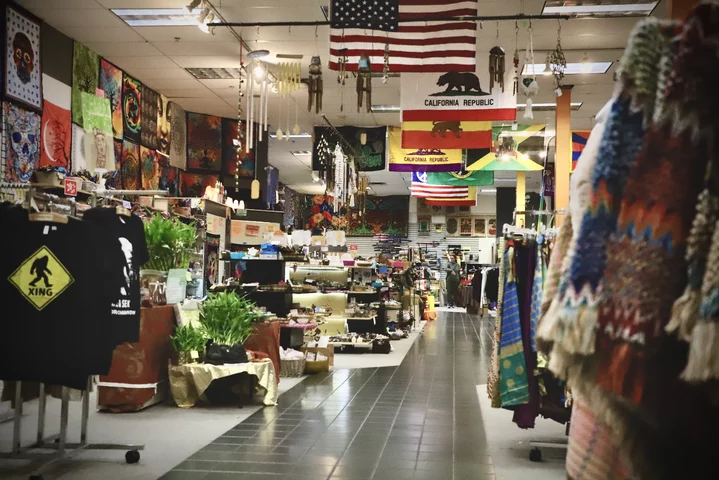It’s the end of Humboldt’s Schatzi’s era | Video/Photos: Andrew Goff
###
After more than 15 years of keeping Humboldt stocked in crystals, Bob Marley posters, duffel bags, bongs, tie-dye bellbottoms and swords, Schatzi’s Hidden Treasures is closing up shop, marking the end of an era at Eureka’s Bayshore Mall.
Schatzi’s first entered the Humboldt consciousness in 2009 when Christof Timotek Schneider-Reuter — “Timo,” to friends — began selling tapestries and incense at a kiosk inside the Bayshore Mall. Mall patrons enjoyed his eclectic wares so much that he decided to expand his business to a storefront. Schatzi’s has relocated a few times over the years, but its current (and final) home is situated near the entrance to Ross Dress for Less, across from the Department of Motor Vehicles.
Now, if you know me, you know I love the Bayshore Mall. I have spent many, many Sunday afternoons bopping around the mall, browsing the shops while munching on a pretzel dog and wondering how the hell F.Y.E. manages to stay in business. (Are Funko Pops!™ the glue that holds it all together?) During these mall outings, I almost always pop into Schatzi’s to admire the trinkets and bask in the Humboldt-flavored chaos of it all.
In my mind, Schatzi’s is a near-perfect microcosm of Humboldt County’s counterculture. Sure, it caters a bit more to festival-goers and New Age hippie types, but something about it captures the eccentric spirit of this quirky little place we call home. I mean, where else can you get a locally crocheted banana slug hat, handmade Yurok jewelry, a Bigfoot t-shirt, and an enormous duffel bag to transport your weed? Exactly.
I dropped by the Bayshore Mall last week, along with the Outpost’s Andrew Goff, to learn more about Schatzi’s impending closure and the store’s legacy here in Humboldt. As we made our way past the “lucky” bamboo and tiny fairy statues, we spotted the owner, Schneider-Reuter, chatting with one of his employees. He offered us a warm, German-accented welcome and took us on a tour of his store.
Looking up at the illuminated sign above the entrance to his store, Schneider-Reuter told us “schatzi” is a German term of endearment that roughly translates to “treasure,” or a sweet nickname you’d call a loved one.
“Treasure’s Hidden Treasure, it’s kind of like a double entendre,” he said. “It’s cute. We’re all schatzis, right? It could be you, it could be your grandfather, your grandmother, your dog, whoever. We’re all schatzis.”
Since Schatzi’s inception over a decade ago, Schneider-Reuter said he has always tried to facilitate a space that “makes everybody feel welcome.” That sentiment is reflected in the huge array of products he offers.
“If you tell us ‘I really want, hmm, hmm, hmm’ I will try to find it,” he said. “I let the customers tell us what we sell, you know? I mean, there are certain things we’re not going to sell, like a Confederate flag or something like that. We do have some values that are important to us, like inclusivity.”
The crown jewel of Schatzi’s – if I may be so bold – sits in the store’s front window. The “Iron Giant,” created by local sculpture artist Richard Kistler, is an 11-foot-tall bong made of 850 lbs of steel. The piece is currently listed for sale on Facebook Marketplace for $1,995.00.
“I’m trying to find a new home for it. I think it should go in the middle of the Arcata Plaza where McKinley used to be,” Schneider-Reuter joked, adding that he’s dropped the price by about $4,000 since he was originally listed. “I started with more because I paid more for it, but at this point, I’m open to whatever.”
Unfortunately, the behemoth bong is not operational. (Sorry, stoners!) However, Schneider-Reuter said a friend had told him it might be possible to make a smoker out of it.
“It’s a really fun piece,” he added. “I just want it to go somewhere where it will be appreciated.”
Another inexplicable feature of Schatzi’s Hidden Treasures is its collection of large and extra-large duffel bags. I have made my own assumptions about the duffel bags over the years, but I decided to ask anyway. “What’s all the luggage for?”
Surely anticipating my question, Schneider-Reuter’s face lit up and he told me he had taken over luggage sales from a man named Lee when he decided to close his business.
“He came to me and he said, ‘Hey, Timotek. I’m leaving but you need to sell duffel bags when I leave.’ Why do I need to sell duffel bags? I had no idea, but I trusted him,” Schneider-Reuter explained. “I bought his leftover inventory and oh my gosh, I think I sold 15 pallets of duffel bags that year, easily. Those are the really big bags. You can put 50 units in those bags.”
“Units?”
“50 pounds of weed,” he laughed. “And then people would take those [bags] and deliver them to wherever they sell their product. It’s a one-way use so they would always come back at the next harvest when they needed more bags.”
As you can imagine, duffel bag sales aren’t what they used to be. When the statewide cannabis industry collapsed a few years back, Schneider-Reuter saw a huge drop in business.
“That [was] a big part of my success,” he said. “With that missing, I mean, that’s the bottom line.”
To many, Schatzi’s impending closure will come as no surprise. American malls have steadily declined in the last 20 years – even more so since the COVID-19 pandemic – as brick-and-mortar retailers struggle to compete with online stores.
“We are down 50 percent in sales since COVID,” Schneider-Reuter said. “I think people [have opted] to purchase items online … understandably so. It’s easier for us to sit at home at night and order and choose and compare to get a decent price [for what we want].”
Three years ago, Brookfield Property Partners, the real estate management company that now owns and operates the Bayshore Mall, agreed to foreclose on the shopping center. At the time, it wasn’t really clear what the “friendly foreclosure” would mean for the future of the Bayshore Mall but it seems to be limping along. Several businesses have left the mall since the foreclosure was announced in May 2021, but several others have come aboard in the same time period.
Another big issue is shoplifting. Schneider-Reuter said the mall has seen a huge uptick in retail theft in the years following the pandemic. Mall security is “pretty hands off,” he said, which has put mall employees in the uncomfortable position of policing shoppers.
“Having to ask my employees to be on watch all the time, like, ‘Hey, what’s in your pocket?’ It kind of takes the fun out of retail,” he said. “I’ve seen so many people walk by with arms full of items … and nobody does anything. … I understand if you need a sandwich, no problem. I get it for certain things, but when it comes to a small shop like mine, it’s hard to measure [the impact] because I don’t really know all the things that get taken.”
However, that’s not why he’s closing Schatzi’s. After 15 years of selling trinkets, Schneider-Reuter says he’s ready to free up his time and move on to the next thing.
“It’s bittersweet,” he continued. “I’ve paid my dues, you know, serving the community and selling items in the mall. In my philosophy, there’s a beginning, a middle and an end to everything, and I’m choosing for this to be the end. I don’t want to end up being burned out on it or feeling bitter about it, you know? It’s good to choose your endings so you can start something new.”
Schatzi’s will officially close its doors in January 2025.









CLICK TO MANAGE